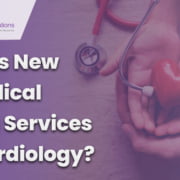The AI-Infused Healthcare Technology in Medical Billing Services
Currently, we can see significant adaptations in healthcare systems. All above, the adaptations have a prominent impact on medical billing services the most. All the proceedings are eventually aimed at attaining a higher patient care standard in healthcare. So, the incorporation of artificial intelligence (AI) and machine learning (ML) proved to be very effective. The two disciplines are now on their way to transforming the overall healthcare being delivered.
In this blog, we will see how AI has helped medical billing services by modernizing healthcare. Before moving ahead, let’s take a look at why the healthcare industry is extensively dependent on AI.
AI Erases the Problems for Medical Billing Services
Now medical billing outsourcing companies can handle broad data sets with ease. The AI-infused software in healthcare stores population data, claims data, and clinical trial data for a long time. So, medical billing services have convenient access to health records with the latest AI-based technology.
The most important feature of any AI-based software is its ability to mimic human actions. Thereby, they can uncover patterns and use their unique algorithm to make vital decisions. So, they are suitable for healthcare data analysis. Moreover, medical billing services can leverage it to perform several repetitive tasks. Alongside this, the unique coding of AI software programs gives them additional insight and efficiency. Overall, medical billing services can do their business more accurately and at a faster speed. Clinical decision-making becomes easy for the providers, and they can offer prime care to patients.
What Benefits Can AI-infused Healthcare Technology Leverage?
Delivering Patient-oriented Experiences
Healthcare organizations use AI to identify details more quickly and correctly. They can do so using massive datasets and machine learning in combination. Eventually, it leads to increased satisfaction among staff members and patients. As long as everything goes smoothly in the claim submission process, the medical billing services can avoid denials. Thereby, the revenues can be collected on time. Alongside this, patients can easily access their health plans and all related details using their patient profiles.
Greater Operational Efficiency
AI technology has synchronization with the analysis of data patterns. So, the same thing any AI-infused program does with the data, resources, and assets of healthcare practices. Therefore, the efficiency of medical billing services and healthcare practice improves a lot. Further, it enhances the performance of clinical and operational workflows and financial operations.
Bridging Disparate Healthcare Data Sets
There are many different forms and fragments of healthcare data. For instance, we have the patient’s initial information received from the front-desk person. Later, we get details from the in-network provider attending to the patients. Similarly, we can get data from providers who may perform ambulatory services and referral services. Thus, organizations may integrate heterogeneous data. By doing so, they create a more comprehensive picture by employing AI and machine learning technology.
Natural Language Processing (NLP) for Medical Professionals
Natural language processing (NLP) is a discipline in IT. It helps the algorithm separate important data when subject matter experts work to train AI algorithms. Thereby, the AI software recognizes and categorizes certain data patterns. It also represents how language is used in their area of the health business. So, we may easily obtain the information required to make well-informed healthcare decisions.
The healthcare industry is one of the most significant adopters of artificial intelligence (AI) advancement among the many industries. It’s expected that AI will have more influence on healthcare reform in the future. Medical practitioners may benefit from AI in healthcare in several ways, including:
- Accelerating the Diagnostic Phase
- Robotic Automation of Healthcare Workflows
- Symptom-checking chatbots
The Practical Use of AI by Other Healthcare Professionals
Healthcare payers
This NLP capability for healthcare payers may be implemented as a virtual agent. It uses conversational AI to link health plan participants with personalized replies at scale.
Healthcare case workers
A case worker can be a professional either for government or private health and human services. They may swiftly mine case notes for important ideas and issues to assist a patient’s treatment using AI technologies.
Clinical operations managers
These healthcare professionals deal with clinical trials. So, AI-infused systems may speed up searches and validate medical coding. Therefore, they can help shorten the cycle time for starting, changing, and managing clinical studies.
Conclusion
At last, all we have to say is that everyone must follow the AI advancements in the healthcare sector. Medical billing services can employ AI-based programs and software to perform better. However, there is one thing that we must adhere to. There are prerequisites for AI that must be met to guarantee secure and dependable solutions.
The US FDA, Health Canada, and the MHRA of the UK have joined forces to create 10 standards. These standards are for Good Machine Learning practice (GMLP) in the creation of AI/ML-powered medical devices, apps, and systems. They are intended to help programmers and AI engineers create secure AI/ML systems for the healthcare industry. Governments are making efforts to regulate the use of AI as soon as feasible, as seen by the alliance’s action.














Leave a Reply
Want to join the discussion?Feel free to contribute!